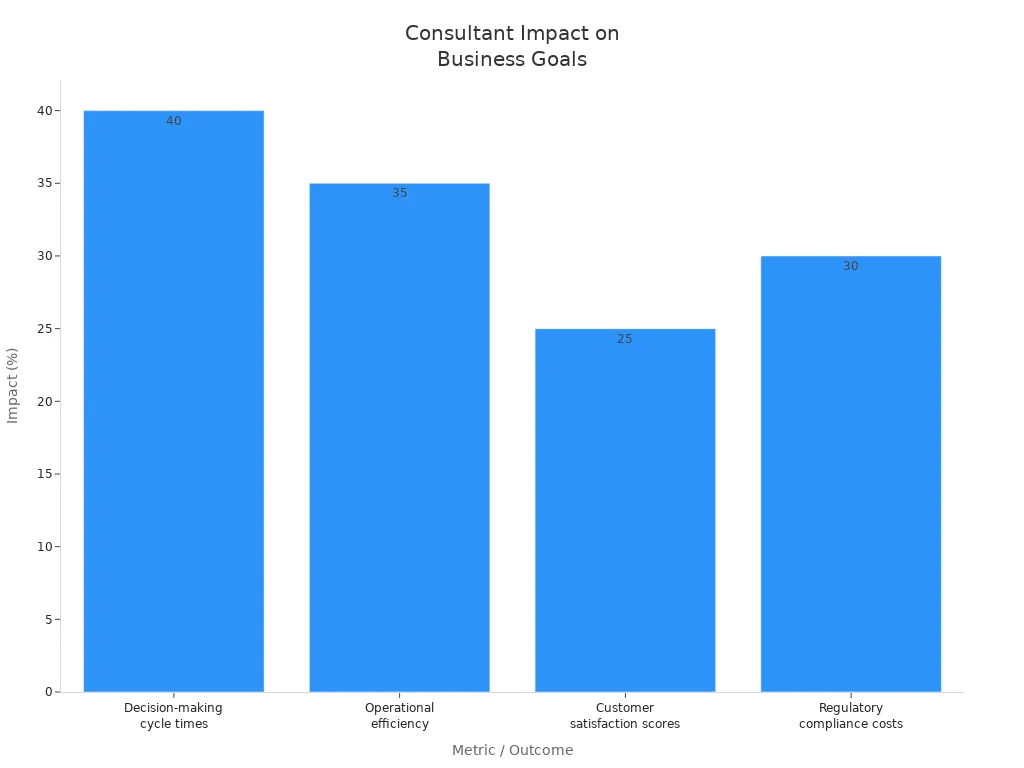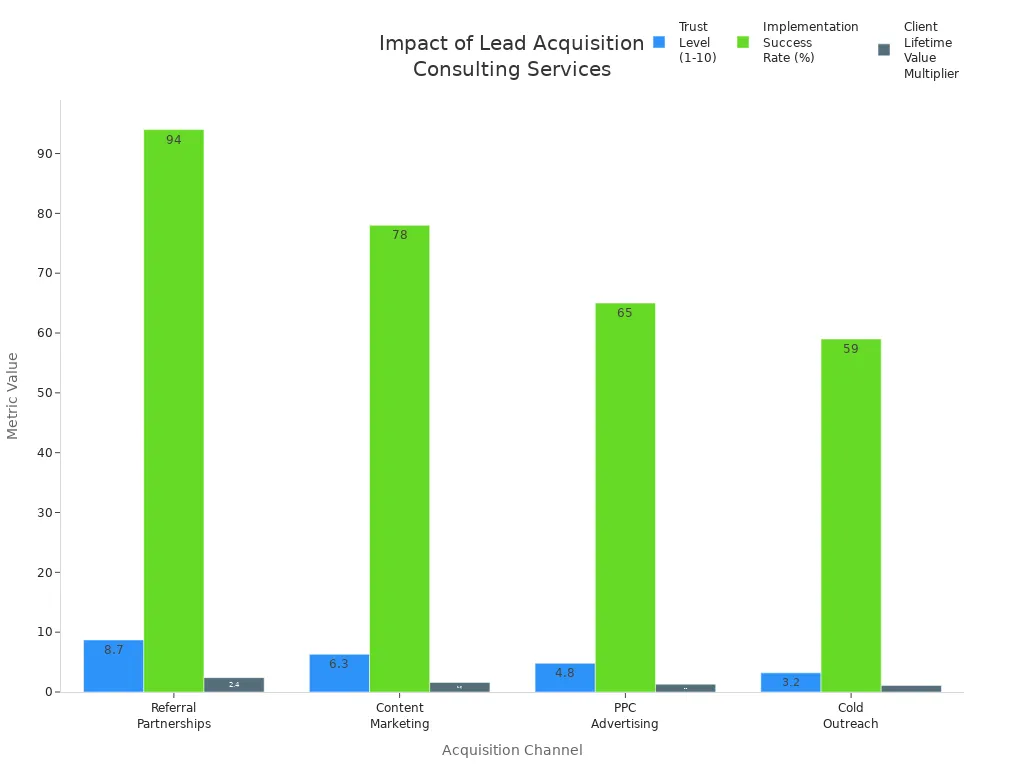5 Reasons Business Consulting Services Matter Now

Today’s business environment moves quickly and grows more complex every year. Recent studies show that Business Consulting Services help organizations improve performance and efficiency by providing expert advice and practical strategies. The consulting industry continues to expand worldwide as companies face demands for digital transformation, regulatory compliance, and changing customer needs.
Metric | Value |
|---|---|
$228.36 million | |
Market Size by 2032 | $318.50 million |
CAGR (2025-2032) | 4.9% |
Regions Covered | North America, Europe, Asia-Pacific, South America, Middle East & Africa |
Business leaders often seek independent, customer-focused Business Consulting Services to address challenges, optimize Resources, and build long-term growth. The Systems and Methodology provided by consultants support companies as they adapt to new realities.
Key Takeaways
Business consulting helps companies navigate market changes and economic uncertainty with clear, data-driven strategies.
Consultants support businesses in setting priorities, managing risks, and driving growth through innovation and technology.
Objective analysis from consultants uncovers root problems and creates custom action plans for lasting improvements.
Consulting services improve cost efficiency by streamlining processes, reducing spending, and optimizing resource use.
Consultants help businesses stay competitive by monitoring industry trends and preparing for future challenges.
Small business consulting offers tailored solutions for talent, technology, growth, and operations to boost success.
Consultants guide both strategy planning and execution, ensuring businesses turn plans into measurable results.
Expert Guidance

Business consulting services offer clarity and direction when companies face uncertainty. A business consultant uses proven methods to guide organizations through complex changes. They help clients understand market shifts and economic challenges, providing a clear path forward.
Navigating Change
Market Shifts
A business consultant helps clients respond to sudden changes in the market. They analyze trends and use data to recommend new strategies. Consultants encourage companies to test business assumptions early, which prevents costly mistakes. For example, consultants help startups create specific value propositions and avoid vague messaging. They also promote disciplined financial management, including budgeting and cash flow monitoring. By focusing on evidence-based strategies, consultants align business goals with measurable outcomes.
Consultants encourage data-driven decision-making. They implement market research, key performance indicators, and performance tracking to replace gut-based decisions with facts.
Economic Uncertainty
Economic uncertainty creates stress for many businesses. Consulting services provide independent advice and structured plans. During the Great Depression, consulting firms shifted from operational fixes to strategic navigation. They helped executives restructure organizations and recover from crises. Today, consultants deliver data-backed recommendations that help leaders avoid costly mistakes. This support enables executives to make confident decisions during turbulent times.
Consultants assist with:
Cash flow management and forecasting
Contingency planning for disruptions
Tailored marketing campaigns using customer data
Cybersecurity solutions to protect financial data
Challenge | Description | How Consulting Services Address It |
|---|---|---|
Delayed payments and unpredictable revenue cycles threaten stability. | Proactive management and forecasting software. | |
Lack of contingency planning | No plans for disruptions increase risk. | Tiered supplier strategies and stakeholder communication. |
Insufficient marketing | Poor promotion reduces revenue. | Integrated customer data tools for targeted campaigns. |
Cybersecurity threats | Security risks threaten financial data. | Best-in-class cybersecurity software. |
Strategic Support
Business Priorities
A business consultant helps clients set clear priorities. They assess current data infrastructure and develop strategies that match business goals. Consultants design scalable systems and ensure compliance with data privacy laws. They provide training and ongoing support to build a data-driven culture.

Consultants deliver benefits such as time and cost savings, better decision-making, and risk mitigation. They help companies anticipate trends and innovate, supporting growth and digital transformation.
Risk Mitigation
Consulting business experts manage risks by developing contingency plans and monitoring compliance. They coach leadership teams and provide proactive problem-solving. Consultants manage organizational change to minimize disruption. They monitor risks and create flexible strategies that adapt to new challenges.
Key benefits include:
Faster decision-making and improved confidence
Accelerated strategy implementation
Access to expert knowledge and industry insights
Sustainable improvements and competitive advantage
A business consultant works with clients to address internal challenges, such as skill gaps and resistance to change. They use innovative frameworks and best practices to deliver results. Consulting business professionals help organizations remain agile and competitive in a changing environment.
Growth & Innovation

Business consulting services play a vital role in helping organizations achieve growth and innovation. Consulting firms use advanced technologies and proven frameworks to guide companies through change. They help businesses discover new opportunities, expand into new markets, and implement strategies that drive success.
New Opportunities
Market Expansion
Consulting firms conduct thorough market research to uncover growth areas, consumer demands, and competitor strategies. This research gives businesses the confidence to make data-driven decisions. Consultants help companies explore new markets by analyzing trends and identifying gaps. They use tools like SWOT and PESTLE analysis to evaluate risks and opportunities. For example, a company may use consulting to enter a new region or launch a new product line. Consultants provide clear business cases and actionable recommendations, which help organizations gain buy-in and move forward quickly.
Consultants support market expansion by:
Identifying untapped customer segments
Analyzing regulatory requirements
Developing entry strategies for new regions
Forecasting demand and setting realistic goals
Service Innovation
Consulting business experts encourage companies to innovate their services. They align data initiatives with business objectives, which helps prioritize efforts that accelerate growth. Consultants help clients evaluate new technologies and business models. They create custom data strategy roadmaps, guiding organizations as they scale and evolve. This approach leads to improved customer experiences and streamlined operations.
Consulting firms use comprehensive research and data-driven analysis to inform critical business decisions, supporting innovation and long-term success.
Fast Implementation
Transformation
Consulting firms enable rapid transformation by identifying inefficiencies and implementing solutions like Lean Six Sigma. They work closely with leadership teams to redesign workflows and operating models. Consultants prioritize transformation projects based on business needs, such as modernizing legacy systems or launching digital products. They provide project management and change management support, ensuring smooth execution.
Key benefits of consulting-led transformation:
Faster adoption of new processes
Reduced resistance to change
Continuous optimization through performance tracking
Technology Use
Consulting firms drive technology adoption by integrating AI, automation, and analytics into business operations. They help organizations select the right software and tools, avoiding delays from poor choices. Consultants break down silos by unifying IT infrastructure, cloud, and security. They also provide hands-on support for ERP implementation and supply chain digitization. This approach enables businesses to run transformation projects alongside daily operations, maintaining business continuity.
Consulting Focus Area | Impact on Growth & Innovation |
|---|---|
AI & Automation | Accelerates data analysis and decision-making |
Cloud Solutions | Enables scalable and flexible operations |
Project Management Tools | Speeds up strategy execution |
Change Management | Reduces resistance and fosters adoption |
Business consulting helps organizations stay agile and competitive. By leveraging advanced technologies and proven strategies, consulting firms position businesses for sustained growth and innovation.
Objective Solutions
Business consulting services deliver objective solutions that help organizations solve problems without bias. A business consultant brings a fresh perspective, acting as a neutral third party. This approach allows companies to address challenges at both the systems and teams level, leading to more effective operational restructuring.
Unbiased Analysis
Root Causes
A business consultant uses proven methods to identify the real reasons behind business problems. They apply tools such as Cause Mapping, the 5 Whys technique, and Pareto charts. These methods help systems and teams move beyond surface symptoms and uncover the true sources of issues. For example, the 5 Whys technique encourages teams to ask "why" repeatedly, which helps them find the root cause rather than just treating the effects. Consultants also use affinity diagrams and fault tree analysis to organize data and visualize cause-and-effect relationships. This structured approach ensures that solutions address the actual problems, not just the visible symptoms.
Consultants act as third-party observers who diagnose problems and analyze data without personal bias.
They use frameworks like MECE, Pyramid Principle, and issue trees to ensure logical and objective analysis.
Consultants gather data, conduct interviews, and test hypotheses to identify root causes and opportunities.
Their recommendations rely on rigorous data analysis and clear presentation.
Internal Bias
Internal teams sometimes struggle with bias, which can cloud judgment and slow progress. A business consultant avoids personal investment in projects, maintaining impartiality. This independence allows consultants to provide honest feedback, even if it is uncomfortable. They use communication techniques such as the SCQA framework and the feedback burger to deliver constructive criticism while preserving trust. Consultants must prioritize the client’s best interests, even if it means saying "no" to popular ideas. This objectivity helps systems and teams make better decisions and avoid common pitfalls.
Consultants differentiate themselves from internal 'yes-men' by providing truthful, sometimes tough, feedback that supports long-term business success.
Effective Plans
Custom Actions
A business consultant works closely with senior management, systems, and teams to review and restructure operations. They develop custom action plans based on evidence from multiple sources, such as organizational metrics, stakeholder input, and scientific research. These plans include detailed steps for communication, training, coaching, and resistance management. Consultants tailor their recommendations to fit the unique needs of each business, ensuring that solutions are practical and achievable.
Change Management
Consultants play a key role in guiding organizations through change. They integrate change management with project and portfolio management to handle multiple initiatives at once. Consultants set clear milestones and metrics to track progress and adjust plans as needed. They help systems and teams prepare for change, create cultural alignment, and measure results. This structured approach builds trust among employees and stakeholders, increasing the chances of successful and lasting change.
Consultant-developed plans rely on evidence-based approaches and continuous monitoring.
Well-structured plans address communication, training, and resistance management.
Integrating change management with project management enhances the effectiveness of change efforts.
Business consulting provides organizations with the tools and guidance needed to solve problems objectively, restructure operations, and achieve sustainable growth.
Cost Efficiency
Consulting services play a crucial role in helping businesses achieve cost efficiency. By applying data-driven strategies and advanced analytics, consultants identify areas where companies can save money and use resources more effectively. This approach supports both immediate savings and long-term financial health.
Lower Costs
Streamlined Processes
Consultants analyze workflows and pinpoint inefficiencies that increase costs. For example, Azra AI's Clinical Consulting Services use workflow analysis to find bottlenecks and redesign processes. This reduces delays and administrative burdens, allowing teams to focus on core activities. MCG Consulting also helps organizations optimize workflows by promoting evidence-based decision-making and supporting change management. These improvements streamline operations and lower expenses.
PwC uses technology-enabled platforms and automation to centralize support functions. By automating contracts, payments, and compliance monitoring, businesses reduce manual work and free up resources for higher-value tasks. Centralized analytics accelerate data processing and lower operational costs. Consultants help companies adopt these solutions, leading to measurable financial gains.
Reduced Spending
Consulting firms use benchmarking tools like Aura to compare a business's costs with industry peers. Aura provides third-party benchmarks that highlight where spending exceeds norms. Consultants then recommend targeted reductions without sacrificing effectiveness. Deloitte reports that holistic cost optimization uncovers inefficiencies across departments, driving transformational savings. For instance, a food company improved supplier portals and collaboration, which led to substantial savings and new revenue opportunities.
The Hackett Group's benchmarking database shows that world-class organizations achieve significant cost reductions compared to average performers. Finance costs drop by 47%, procurement by 29%, HR by 22%, and IT by 12%. Consultants use these insights to guide businesses toward sustainable cost optimization.
Resource Use
Productivity
Consulting services help businesses boost productivity through process optimization and automation. Consultants integrate real-time workforce analytics and labor market data to tailor recommendations. Automation of routine tasks, such as time tracking and invoicing, allows teams to focus on high-impact activities. Clear Service-Level Agreements prevent scope creep and ensure effective resource allocation. Structured scheduling and time management improve individual and team productivity.
Tip: Automation and analytics not only save time but also improve decision-making and client communication.
Asset Management
Consultants support businesses in managing assets more efficiently. Enterprise Asset Management solutions enable predictive maintenance and asset integrity management. By integrating asset and work order management into daily operations, companies maintain peak performance and reduce risk. Consulting services include business process engineering and organizational consulting to optimize asset value. Advanced analytics platforms provide insights for asset lifecycle management, helping businesses sustain value and minimize risk exposure.
Consulting fees vary based on expertise and project scope. In the US, average hourly rates range from $100 to $500 or more. Some consultants charge up to $1,000 per hour for specialized services. Businesses often negotiate fees based on expected value and project complexity. The value provided by consulting services often justifies the cost, as consultants deliver measurable improvements in sales, efficiency, and strategic advantage.
Consulting Fee Type | Typical Range (USD) | Influencing Factors |
|---|---|---|
Hourly | $100 - $1,000 | Expertise, project scope, demand |
Daily | $800 - $8,000 | Engagement type, market averages |
Project-based | Varies | Complexity, expected ROI |
Retainer (monthly) | $2,000 - $20,000+ | Duration, exclusivity, resources |
Consulting services help businesses save money, optimize resources, and achieve sustainable growth. By leveraging benchmarking, automation, and analytics, consultants deliver value that often exceeds their fees.
Competitive Edge
Business consulting services help organizations stay ahead in a fast-changing world. Companies face new competitors, shifting markets, and rapid technology changes. Consulting firms play a key role in helping businesses monitor trends, adopt best practices, and prepare for future challenges.
Industry Trends
Market Monitoring
Consulting firms use advanced tools to track market changes and competitor activity. They gather real-time data on wage trends, hiring, and customer preferences. This information helps businesses adjust quickly and make informed decisions. Consultants use both qualitative and quantitative research, including surveys and benchmarking, to provide a clear view of the market.
Consulting Type | Research Evidence & Impact |
|---|---|
Strategic Consulting | Bain research shows only 12% of corporate transformations succeed, highlighting the need for effective strategic planning. |
Operations Consulting | McKinsey reports up to 25% cost reduction and improved customer satisfaction through operational excellence. |
Financial Consulting | Financial consulting improves budgeting, forecasting, and risk management, enhancing financial health. |
HR Consulting | Deloitte finds companies with strong HR practices are 3.5 times more likely to financially outperform peers. |
IT Consulting | Gartner reports a 20-30% productivity increase from successful IT consulting implementations. |
Consulting business experts bring fresh perspectives and specialized skills. They identify innovative solutions that internal teams may overlook. By using research-driven strategies, consultants help businesses optimize processes and maintain a competitive edge.
Best Practices
Consulting firms guide businesses in adopting industry best practices. They advise on workforce design, flexible team structures, and digital transformation. Many firms now offer services in technology, ESG (environmental, social, and governance), and sustainability. Consultants help companies build internal skill marketplaces and design diverse teams. They also support green talent strategies and compliance with ESG goals.
Consulting firms leverage AI and analytics for labor market intelligence.
They promote employee well-being through workload analysis and scheduling redesigns.
Consultants help reconfigure office spaces to foster innovation and collaboration.
Consulting business services use a research-first approach. This enables companies to innovate and position themselves for long-term success.
Future-Ready
Resilience
Consulting firms help businesses build resilience by strengthening internal and external networks. They encourage organizations to develop adaptive strategies and foster continuous learning. Consultants use capacity planning and workload analytics to help companies anticipate change and respond with agility. They embed workforce planning into business strategy, ensuring operational continuity during disruptions.
Resilience relies on strong relationships and the ability to adapt quickly.
Proactive strategies, such as forecasting and scenario planning, help businesses prepare for uncertainty.
Consultants support organizations in developing new collaborations and workarounds during challenges.
Long-Term Planning
Consulting services focus on long-term planning to ensure sustainable growth. Firms help businesses align workforce needs with strategic objectives. They invest in talent development, advanced training, and mentorship. Consultants guide companies in integrating technology, such as AI and digital tools, to improve efficiency and innovation.
Note: Over 80% of management consultants now use generative AI daily, which improves research quality and delivery standards.
Consulting firms emphasize strategic cost management and operational efficiency. They help businesses plan for the future by embedding resilience and adaptability into every level of the organization. This future-ready approach ensures companies remain competitive and prepared for whatever comes next.
Types of Consulting Services
Planning & Strategy
Planning and strategy consulting services help organizations set clear goals and create actionable plans. A consultant guides business leaders through strategic planning, which involves building consensus among stakeholders and aligning everyone with a shared vision. Strategic planning increases impact by setting measurable objectives and allowing real-time evaluation. This process helps businesses avoid impulsive decisions and maintain focus on their core priorities.
Consultants manage the planning process, facilitate engagement, and support implementation. They use structured approaches to guide decision-making and prevent mission drift. Strategic planning also improves morale and financial stability by keeping teams focused on long-term objectives.
Key Services and Focus Areas | |
|---|---|
Corporate and Growth Strategy | Market, competitor, and customer insights; business model reinvention; portfolio strategy; digital transformation; go-to-market strategy |
Transaction Strategy and Execution | Operational and IT diligence; commercial and vendor due diligence; integration and divestiture strategy; value realization and tracking |
Restructuring and Turnaround Strategy | Crisis management; operational challenges; leadership and stakeholder consensus; rapid tangible results |
Digital Strategy Consulting | Digital business strategy design and delivery; data-driven services; digital and business transformation |
Consultants help businesses of all sizes develop strategies that guide growth and transformation. Large organizations often require complex planning across multiple departments, while small businesses benefit from focused, agile approaches.
Execution Guidance
Execution guidance consulting ensures that strategies become reality. A consultant provides ongoing support and tools to help businesses implement recommendations. For example, ClearPoint Strategy acts as a project manager for strategy execution, leading to improvements in efficiency, revenue growth, and employee engagement.
Companies that excel in digital execution are more likely to achieve double-digit revenue growth. Consultants help clients stay on track by offering continuous support, monitoring progress, and adjusting plans as needed. Research shows that 67% of well-formulated strategies fail due to poor execution, highlighting the importance of expert guidance.
McKinsey reports companies with strong digital execution are 2.5 times more likely to grow revenue quickly.
PwC finds that cost optimization with consultant support increases profit margins by 10-15%.
Gartner data shows a 20-30% sales increase for businesses using consultants in growth initiatives.
Deloitte’s survey reveals that most executives credit consultants for successful strategic initiatives.
Consultants bridge the gap between planning and results, helping clients achieve sustained business performance.
Lead Acquisition
Lead acquisition consulting services help businesses find and convert new clients. Consultants focus on quality leads through referral partnerships, strategic alliances, and personalized outreach. These methods deliver higher trust levels and faster decision timeframes compared to traditional marketing.
Metric | Referral Partnerships | Content Marketing | PPC Advertising | Cold Outreach |
|---|---|---|---|---|
8.7 | 6.3 | 4.8 | 3.2 | |
Decision Timeframe | 2-3 weeks | 2-3 months | 1-2 months | 3-5 months |
Implementation Success Rate | 94% | 78% | 65% | 59% |
Client Lifetime Value Multiplier | 2.4x | 1.6x | 1.3x | 1.1x |

Referral partnerships yield conversion rates much higher than cold outreach. Sales cycles shorten, and acquisition costs drop, improving return on investment. Referred clients approve larger project scopes, showing greater satisfaction and value. Consultants help businesses build partnership ecosystems, which influence most enterprise buying decisions.
Lead acquisition consulting emphasizes targeted strategies that drive business growth and improve client acquisition rates. Consultants help clients access qualified leads faster and more cost-effectively, supporting sustainable success.
Small Business Consulting
Small businesses face unique challenges that differ from those of larger organizations. A consultant who specializes in small business consulting understands these differences and tailors solutions to fit each situation. Many small businesses operate with limited resources, making every decision critical for success.
A consultant helps small businesses address several key challenges:
Talent Acquisition and Retention
Small businesses often struggle to attract and keep skilled employees. Limited budgets make it hard to compete with larger companies. A consultant develops recruitment strategies, advises on compensation, and helps create a positive workplace culture. Training programs also support employee growth and satisfaction.Technology Adoption
Keeping up with new technology can feel overwhelming. Many small business owners lack the time or knowledge to choose the right tools. A consultant identifies suitable technology solutions, supports integration, and trains staff. This guidance helps businesses stay competitive and efficient.Scaling and Growth
Growing a business while maintaining quality and customer satisfaction is a common challenge. A consultant works with clients to develop strategic growth plans. They provide market insights, build scalable processes, and help manage the risks of expansion.Operational Efficiency
Small businesses benefit from streamlined workflows and clear procedures. A consultant reviews current operations, recommends automation where possible, and helps create standard operating procedures. These changes save time and reduce costs.
The table below highlights how consulting services address small business challenges and the results achieved:
Unique Challenge | Consulting Solution | Documented Result |
|---|---|---|
Limited resources | Prioritize investments, maximize efficiency | Local bakery expanded into catering, increasing revenue by 40% |
Market competition | Analyze market, develop differentiation | Online retailer doubled revenue in 6 months |
Cash flow management | Budgeting, forecasting, financial planning | Plumbing company improved efficiency by 30% and profitability by 20% |
Technology adoption | Identify and implement tech solutions | N/A |
Talent acquisition and retention | Recruitment strategies, training | N/A |
Tip: Small business consulting offers expertise and an objective perspective. Consultants provide customized solutions and ongoing support, helping clients adapt to changing markets and achieve sustainable growth.
A consultant brings experience from many industries. This broad view helps clients avoid common pitfalls and focus resources where they matter most. Small business consulting delivers measurable improvements in revenue, efficiency, and long-term success.
Business consulting services remain essential for organizations seeking improvement and growth.
Consultants help develop strategies, set clear goals, and assess resources.
They provide access to expertise and guide digital transformation.
Consulting improves efficiency, customer experience, and compliance.
It boosts employee engagement and cost savings.
Consultants support innovation and long-term planning.
Benefit Area | Impact |
|---|---|
Clear direction and measurable results | |
Efficiency | Faster operations, lower costs |
Technology | Scalable solutions, better experience |
For more details on how consulting can help your business, reach out to learn how systems and teams can support your goals.
FAQ
What does a business consultant do?
A business consultant analyzes a company’s operations, identifies problems, and recommends solutions. They help leaders set goals, improve processes, and guide change. Consultants use data and industry knowledge to support growth and efficiency.
How do consulting services benefit small businesses?
Consulting services help small businesses solve challenges like cash flow, hiring, and technology. Consultants offer practical advice, create growth plans, and suggest tools that fit limited budgets. Small businesses gain expert support without hiring full-time staff.
How much do business consulting services cost?
Consulting fees vary by expertise and project size. Hourly rates often range from $100 to $1,000. Some consultants charge by project or monthly retainer. Businesses should compare costs and expected value before choosing a consultant.
When should a company hire a consultant?
A company should hire a consultant when facing complex problems, planning major changes, or needing outside expertise. Consultants help during growth, digital transformation, or when internal teams lack specific skills.
What industries use business consulting services?
Many industries use consulting, including healthcare, finance, retail, manufacturing, and technology. Consultants adapt their methods to fit each industry’s needs and challenges.
Can consultants help with digital transformation?
Yes. Consultants guide companies through digital transformation by recommending new technologies, training staff, and improving workflows. They help businesses stay competitive in a changing digital world.
How do consultants ensure unbiased advice?
Consultants act as independent experts. They use data, research, and proven frameworks to analyze problems. Their outside perspective helps companies avoid internal bias and make better decisions.
What is the difference between strategy and execution consulting?
Strategy consulting focuses on planning and setting goals. Execution consulting helps put those plans into action. Both types work together to help businesses achieve results.



